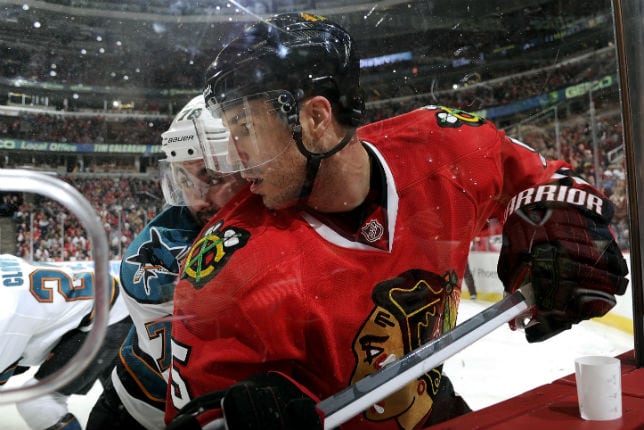
Steve Montador 'knew he was going to pass away early'
Steve Montador was so proactive about his concussion problems that he agreed to donate his brain after his death to one of the leading experts and pioneers in concussion research, Dr. Charles Tator. Montador was found dead over the weekend at the age of 35.
 Steve Montador 'knew he was going to pass away early'
Steve Montador 'knew he was going to pass away early'The first time Chris Montador noticed a change in his brother was the Christmas of 2011 when he came home for a short visit while playing with the Chicago Blackhawks. That would be Steve Montador’s last NHL season and after shorts stints in the minors and the KHL, his career ended last season, in large part because of concussion problems.
Chris Montador always knew his brother as an upbeat person with a positive outlook on life and someone who always looked for solutions. What he saw that Christmas was a completely different personality. “He wasn’t my brother,” Chris Montador told thn.com in an interview Thursday. “He was like a different person inside his body and it breaks my heart. It breaks my heart today. He wanted to be the same guy, but he just couldn’t.”
Montador, who played 10 NHL seasons with six teams, was found dead at his home in suburban Toronto Sunday morning. Suicide and foul play have been ruled out and until the results of an autopsy are concluded, the cause of death remains a mystery. It is not known whether Montador’s well-documented history of concussion issues and depression led to his death, but his passing at such a young age has once again put the focus on how the NHL and the hockey world as a whole deals with concussions.
“He just either stopped breathing or his heart went,” Chris Montador said. “With respect to his brain, I don’t know how many cylinders were working in there. And as the days have gone on, I think my brother knew he was going to pass away early. He never said that to me, but I just feel he kind of knew that. And as my dad said, he packed 70 years into 35.”
(One concussion expert I spoke with said it’s extremely unlikely that concussion problems would have led to a person’s lungs or hearts failing. Those two organs, I was told, don’t require as much brain energy, which is why many people with brain injuries live for extended periods in vegetative states. Their hearts and lungs are the only things that are working. An aneurism from a leaking vessel is a possibility, but there’s a good chance that would have been detected in a scan.)
And in what can only be described as a cruel twist of irony, Steve Montador’s family has had a long association with one of the world’s leading experts and pioneers on concussion research, Dr. Charles Tator. In fact, Montador’s father, Paul, has been a longtime member of the board of directors of the ThinkFirst Foundation, an organization dedicated to educating young people about the prevention of brain and spinal cord injuries. (ThinkFirst has since joined an umbrella organization called Parachute Canada, which is dedicated to preventing injuries and saving lives. Paul Montador is listed on the board of directors.)
So it should come as no surprise that Steve Montador was extremely proactive about dealing with the concussion problems that ended his career and brought on depression issues, to the point where Montador decided a couple of years ago to donate his brain after his death to the Canadian Sports Concussion Project, which is headed up by Tator. The doctor will examine Montador's brain and be able to determine whether he suffered from Chronic Traumatic Encephalopathy (CTE), a degenerative disease that can only be diagnosed postmortem and is associated with repeated concussions.
"He probably thought he was going to live a long life and he said a couple of years ago, 'My brain is yours' " Dr. Tator said. "We certainly don't ask for premature donations. We want these people to live long lives, but unfortunately that isn't the case here."
“We all talked about it a lot because we both had concussions as kids,” Chris said. “My dad had a very big influence on my brother to seek out answers and my brother was proactive in everything he did.”
In fact, Chris Montador now wonders what effect all the research his brother was doing on his concussion issues had on him. Chris said his brother was constantly asking questions and former teammates and friends say Montador left no stone unturned in his quest for answers, travelling all over North America to seek the opinion of experts. Looking back now, Chris isn’t sure his brother wasn’t overloaded and overwhelmed with all the information he was getting.
“He did so much research and talked to so many people, I think he came to the conclusion, ‘I may never be normal again,’ “ Chris said. “He talked to so many doctors and trainers and when he realized he might never be normal, that probably freaked him out. He put on a good face at family events, but I know deep down he wasn’t himself.”
Montador’s funeral will be held Saturday afternoon and his family has asked for donations to be made to one of Right to Play, Parachute Canada or the Canadian Sports Concussion Research Project.
“My brother would want (the concussion issue) to be at the forefront,” Chris said. “And my family would be the first ones to say, ‘Let’s get this out there.’ “